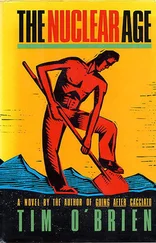TIM O’BRIEN
In the Lake of the Woods

Harper Press An Imprint of HarperCollins Publishers 1 London Bridge Street London SE1 9GF
First published in Great Britain by Flamingo 1995
First published in the USA by
Houghton Mifflin/Seymour Lawrence 1994
Copyright © Tim O’Brien 1994
The Author asserts the moral right to be
identified as the author of this work
Portions of this book have appeared, in substantially different form,
in The Atlantic Monthly, Boston Magazine and Esquire
The author is grateful for permission to quote from the following:
‘Shame’ by Robert Karen, Copyright © 1992 by Robert Karen,
as first published in The Atlantic Monthly , February 1992; ‘Homeless My Lai Vet Killed in Booze Fight,’ from the Boston Herald , September 14, 1988, reprinted with permission of the Boston Herald .
A catalogue record for this book
is available from the British Library
All rights reserved under International and Pan-American Copyright Conventions. By payment of the required fees, you have been granted the nonexclusive, nontransferable right to access and read the text of this e-book on-screen. No part of this text may be reproduced, transmitted, downloaded, decompiled, reverse engineered, or stored in or introduced into any information storage and retrieval system, in any form or by any means, whether electronic or mechanical, now known or hereinafter invented, without the express written permission of HarperCollins e-books.
Source ISBN: 9780006543954
Ebook Edition © APRIL 2013 ISBN 9780007381753
Version: 2015-07-03
HarperCollinsPublishers has made every reasonable effort to ensure that any picture content and written content in this ebook has been included or removed in accordance with the contractual and technological constraints in operation at the time of publication .
FOR KATE
Although this book contains material from the world in which we live, including references to actual places, people, and events, it must be read as a work of fiction. All dialogue is invented. Certain notorious and very real incidents have been altered or reimagined. John and Kathy Wade are creations of the author’s imagination, as are all of the characters who populate the state of Minnesota and the town of Angle Inlet in this novel.
Cover
Title Page
Copyright
Dedication
Excerpt
1 How Unhappy They Were
2 Evidence
3 The Nature of Loss
4 What He Remembered
5 Hypothesis
6 Evidence
7 The Nature of Marriage
8 How the Night Passed
9 Hypothesis
10 The Nature of Love
11 What He Did Next
12 Evidence
13 The Nature of the Beast
14 Hypothesis
15 What the Questions Were
16 Evidence
17 The Nature of Politics
18 Hypothesis
19 What Was Found
20 Evidence
21 The Nature of the Spirit
22 Hypothesis
23 Where They Looked
24 Hypothesis
25 Evidence
26 The Nature of the Dark
27 Hypothesis
28 How He Went Away
29 The Nature of the Angle
30 Evidence
31 Hypothesis
Keep Reading
Acknowledgments
About the Author
Praise
Also by the Author
About the Publisher
In September, after the primary, they rented an old yellow cottage in the timber at the edge of Lake of the Woods. There were many trees, mostly pine and birch, and there was the dock and the boathouse and the narrow dirt road that came through the forest and ended in polished gray rocks at the shore below the cottage. Then there were no roads at all. There were no towns and no people. Beyond the dock the big lake opened northward into Canada, where the water was everything, vast and very cold, and where there were secret channels and portages and bays and tangled forests and islands without names. Everywhere, for many thousand square miles, the wilderness was all one thing, like a great curving mirror, infinitely blue and beautiful, always the same. Which was what they had come for. They needed the solitude. They needed the repetition, the dense hypnotic drone of woods and water, but above all they needed to be together.
At night they would spread their blankets on the porch and lie watching the fog move toward them from across the lake. They were not yet prepared to make love. They had tried once, but it had not gone well, so now they would hold each other and talk quietly about having babies and perhaps a house of their own. They pretended things were not so bad. The election had been lost, but they tried to believe it was not the absolute and crushing thing it truly was. They were careful with each other; they did not talk about the sadness or the sudden trapdoor feeling in their stomachs. Lying still under their blankets, they would take turns thinking up names for the children they wanted—funny names, sometimes, so they could laugh—and then later they would plan the furnishings for their new house, the fine rugs they would buy, the antique brass lamps, the exact colors of the wallpaper, all the details, how they would be sure to have a giant sun porch and a stone fireplace and a library with tall walnut bookcases and a sliding ladder.
In the darkness it did not matter that these things were expensive and impossible. It was a terrible time in their lives and they wanted desperately to be happy. They wanted happiness without knowing what it was, or where to look, which made them want it all the more.
As a kind of game they would sometimes make up lists of romantic places to travel.
“Verona,” Kathy would say, “I’d love to spend a few days in Verona.” And then for a long while they would talk about Verona, the things they would see and do, trying to make it real in their minds. All around them, the fog moved in low and fat off the lake, and their voices would seem to flow away for a time and then return to them from somewhere in the woods beyond the porch. It was an echo, partly. But inside the echo there was also a voice not quite their own—like a whisper, or a nearby breathing, something feathery and alive. They would stop to listen, except the sound was never there when listened for. It mixed with the night. There were rustlings in the timber, things growing and things rotting. There were night birds. There was the lap of lake against shore.
And it was then, listening, that they would feel the trapdoor drop open, and they’d be falling into that emptiness where all the dreams used to be.
They tried to hide it, though. They would go on talking about the fine old churches of Verona, the museums and outdoor cafés where they would drink strong coffee and eat pastries. They invented happy stories for each other. A late-night train ride to Florence, or maybe north into the mountains, or maybe Venice, and then back to Verona, where there was no defeat and where nothing in real life ever ended badly. For both of them it was a wishing game. They envisioned happiness as a physical place on the earth, a secret country, perhaps, or an exotic foreign capital with bizarre customs and a difficult new language. To live there would require practice and many changes, but they were willing to learn.
At times there was nothing to say. Other times they tried to be brave.
“It’s not really so terrible,” Kathy told him one evening. “I mean, it’s bad, but we can make it better.” It was their sixth night at Lake of the Woods. In less than thirty-six hours she would be gone, but now she lay beside him on the porch and talked about all the ways they could make it better. Be practical, she said. One day at a time. He could hook up with one of those fancy law firms in Minneapolis. They’d shop around for a cheap house, or just rent for a while, and they’d scrimp and draw up a budget and start paying off the debts, and then in a year or two they could jump on a plane for Verona, or wherever else they wanted, and they’d be happy together and do all the wonderful things they’d never done.
Читать дальше













